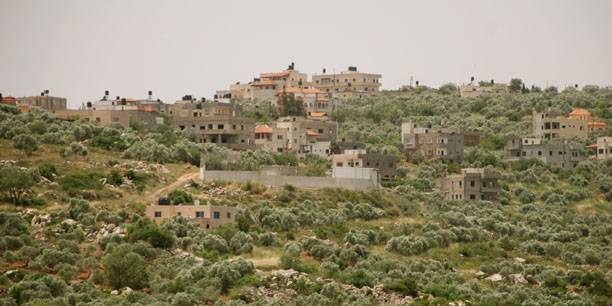
 Trace Your Delicacy
Trace Your Delicacy

 Find Canaan Locally
Find Canaan Locally
'ANIN




'Anin Village
Download printable profile (PDF)
Bread and Olive Oil
The village of Anin is located a few kilometers northwest of the city of Jenin. With a 53- member Palestine Fair Trade cooperative, the village of Anin supplies Canaan Fair Trade about 130 tons of olive oil annually. Out of the 3000 Dunoms of Anin’s agricultural land, 2671 Dunoms are certified organic and are dedicated to olive farming making the views from its elevated hills an unforgettable one with groves of olive trees covering its well kept terraces.
People in the village of Anin like to say “he who has two lions in the house will never go hungry”. Lions being a symbol of strength in Palestinian culture refer to olive oil and bread in this saying. According to Awad Milhim, an olive oil producer and member of the Anin Palestine Fair Trade cooperative, oil and bread are all one needs to guarantee survival. It is no accident that survival is a critical theme in this perseverant village. Other than the regular modern day challenges farmers around the world face and the Israeli segregation wall that imprisons the whole village, farmers in Anin suffer from continuous crop loss due to the activities of wild boars that the Israeli army releases into their fields.
Abu Mahran, who lost over 90 olive trees in 1996 when the army decided to uproot all the trees in his land, says that as a form of resistance he had since replanted his field with almond trees. While these almond trees are now at an age where they can give a yield of over one ton a year, Abu Mahran only harvests approximately 115 kg a year since the boars destroy the trees and eat most of the almond fruits. Armed with only the lights of his tractor, he and friends from the Anin cooperative spend the night in the field in order to protect his trees. “I am now considering uprooting my almond trees and planting olive trees instead. The boars don’t like olive trees because they are bitter so they will not attack my crop and I would not have to spend my nights fending off pigs. I feel so sad because this environment is perfect for these trees and they produce excellent organic almonds.”
Defiant Spirits
While many farmers would get frustrated and give up, Abu Mahran and his colleagues in the cooperative are getting together to discuss ways they can help each other combat this problem. In a context where they can feel disempowered, Abu Mahran, Awad, and others like them say they find strength in the brotherhood that was born from their work and mutual interest. Sitting around a coffee table for an afternoon get together, Abu Mus’ab, who is one of the two elected representatives of the Anin cooperative in the Palestine Fair Trade Association, says that he feels a great sense of commitment to the cooperative because he is one of them. “I am a farmer as well. So their worries are my worries, their problems are the same as my problems and most importantly I am chosen by consensus to represent Anin and our cooperative. This makes me feel empowered to make a difference.”
Established in 2006, the Anin cooperative is one of the biggest producers of olive oil due to its large membership of over 50 farmers selling the majority of their production to Canaan Fair Trade. “ We love working with Canaan Fair Trade because from the beginning there was a clear agreement regarding prices and everything else. Canaan is obligated to buy from us but we are not obliged to sell to them. We are also the ones setting the olive oil price each year through the pricing committee we have at PFTA. We chose to sell to Canaan because they keep their word and they buy from us every year so we do not have to worry about marketing our oil” says Awad.
When asked about the benefits of working in a cooperative, most members asserted that working in a cooperative has made their lives easier. To make sure that their organic olives are not in contact with olives from conventional producers, the olive press is cleaned thoroughly before the member producers start pressing. According to Abu Mahran, “This is not only good for the quality of olive oil. It is also great for us because instead of waiting all day at the press like we used to in order to get a turn, we now organize ourselves and each person knows what time and when they can press their olives. So after a long day of work they can leave their olives at the press, go home, eat, rest, and then come back to the press when it is their turn. This may seem like a small thing but for us farmers it is a very important point because we used to feel more exhausted waiting at the press then actually working in the field.”
Collective Progress
As the Palestine Fair Trade Anin cooperative keeps growing, producers are starting to think about establishing more independence and inviting new members. They are very pleased with the work they have done and even more with the great international recognition of their hard work and delicious olive oil. But this is not the only thing that makes the members of the Anin cooperative proud. According to Abu Mahran, “what we are doing in the cooperative is becoming both student and teacher to each other. We are learning new things from each other all the time and we are learning that it is only through collective decision-making that we can truly serve our own families, lands, and community. This maybe an obvious thing but as we struggle for our freedom, these things become important values to keep alive and nourish.”



